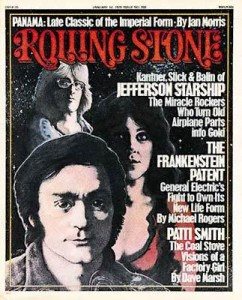Rolling Stone #203: The Who
Who Split? They Can Explain
Houston – The advance word was “shaky.” Roger Daltrey and Peter Townshend were at bitter odds. Keith Moon was looning dangerously in Los Angeles, displaying his genitalia onstage with a group of local weirdos called the Cycle Sluts. John Entwistle was already a solo touring and recording attraction. “The Who will never just fizzle out,” Townshend had ofttimes been quoted as saying. “They’ll go out with a huge explosion.” As the band neared the beginning of an extensive American tour – their first in two years – the fuse appeared lit.
But the Who that bounded out onstage November 20th at Houston’s 17,000-seat Summit (sold out a month before in about three hours) delivered the stunning performance of a band not about to forsake its 12-year existence (see Performance, page 78). Following the band’s solid one-two opening punch in “Substitute” and “I Can’t Explain,” a euphoric Daltrey remarked to the audience, “Those were a couple blasts from the past – ’65 actually; now here’s something from ’75,” and the band kicked into their newest single, “Squeeze Box.” It was, along with an introduction to the two excerpts from Tommy, the longest stage announcement of the evening. And according to tour manager Peter Rudge, this low verbal profile is exactly the Who’s strategy for survival in the Seventies.
“In the past year,” Rudge explained, “this band, especially Townshend, has been very earnest in trying to explain themselves. As a result, the Who’s private lives, thoughts and insecurities have been public knowledge. Now, at least for the time being, they’ve decided to internalize themselves. You know, Roger and Peter are closer than they’ve been in ten years and there’s no reason to endanger that.”
Translation: little stage patter and absolutely no interviews. Townshend, long regarded as rock’s most accessible and articulate spokesman, explained this stance with uncharacteristic brevity: “I think it’s time we give ourselves and the media a bit of a break.”
At the first week of concerts wound its way through Baton Rouge, Memphis, Atlanta, Murfreesboro (Tennessee) and Hampton Roads (Virginia), the show topped itself nightly. There was no instrument demolition, but the group’s legendary acrobatics – Townshend’s leaps and spins and ferocious windmill strums, Daltrey’s lasso microphone, Moon’s shattering drumsticks – all worked as well as ever.
Following a tumultuously received set in Memphis, Roger Daltrey paused backstage to deny previous observations made in, among other places, ROLLING STONE. “I’m glad we’re breaking up,” Daltry said with mock solemnity. “The band would have never found out otherwise.”
Daltrey, who seems to have indoctrinated a new of Who fans through his appearances in the films Tommy and Lisztomania, went on to scoff at another printed rumor that the Who had rehearsed their latest album with another, more proficient drummer than Keith Moon. “There’s only one Who drummer,” Daltrey said. “Just one – Moon. And any story that we played with anybody else is a fucking lie.”
On a less combative note: “This is the best tour yet. No question about it. The last American tour, when we did all of Quadrophenia, the band was using a lot of tapes. It was like they were the show and we were backup. The experience was a good one but it was decevingly bad for our morale. It wasn’t the Who that was cumbersome, it was our show at the time. The concert we do now proves that.”
Daltrey went on to insist that the group has never been closer. “It’s a great feeling,” he said giddily, “to be standing onstage and feel the power we have. We’re the best band in rock & roll. And we’re going to stay there. Nothing else matters – the films, all the publicity. Just the music, that’s the point of it all. That rush is too great to give up for anything. We’re all incredibly happy to be back playing again.”
And for tour plans beyond next month? Like in the spring? Daltrey gulped down a drink. “Just say that we’ll be getting around to everybody.”
Courtesy of Rolling Stone #203 – Cameron Crowe – January 1, 1976


